A blog entry by Karen Timothy, a participant in the July 2011 Koins Expedition.
The phrase “Run For Your Life” took on a whole new meaning this past July as we held the Koins second annual Half Marathon; this time from Myenzeni to Gona. As Monica Woodland was pondering what to do for her project in Kenya, she heard about last year’s race and knew without a doubt that this was what she wanted to put her energies into…and what a lot of energy that was.
The race is quickly becoming the opening ceremony for the dedication of a new school. Last year about 100 Kenyan men showed up for the race but the only women to participate were a few girls from the expedition. The race went from the KCC (Koins Community Center) to the new school and not all starters finished the race. Speculation has it that when it became apparent to the slower runners that they were not going to be able win the $100 prize money, many of them lost interest and dropped out.
Monica had a different vision for the race this year. Knowing that Kenyan women are not treated with the same deference American women are, she wanted to provide an incentive for women to enter the race and be able to win some money of their own. Word soon spread around the village that there would be cash prizes for the 1st, 2nd and 3rd place winners for both men and women and we American women were quite excited about the idea of a Kenyan woman being treated equal to the men. The night before the race, Monica and I sat at one of the school lunch tables that were our only furniture in the KCC, playing out scenarios of how much money to award and when to award it. As we were tossing around our ideas, Bret (Koins founder, Baba [father] Bret to the Africans and bigger-than-life-shaved-headed-America) joined us and threw a wrench into our brainstorming. He was quite firm in his feelings that the women should not receive as much prize money as the men. Monica and I both felt the hackles on our necks raise a little at this. He explained that they would not expect it and that their husbands would just take it anyway –“ it’s just the African way.” He also said it wouldn’t be wise to award the women’s prize money along with the men’s at the Gona school celebration. “But,” he said in parting, “it’s your race.”
After Bret left, Monica and I talked a little more. She got opinions from a few of the other women in the group and finally made a decision. We proceeded with our girl-power pride intact to prepare the awards, placing the money into envelopes.
The next morning, Tara and I were stationed at the second water stop with an African college student named Charles. We were dropped off on a dirt road with our water and cups and went about setting up our things on a school desk that had been placed there for our use. Immediately a group of children started waving and shouting their now familiar greeting, “Jambo,” drawing closer each moment as their curiosity piqued. Shortly, three teens on a motorcycle drove up and demanded water in what to Tara and I, were rather challenging, if not angry, voices. Charles barked back at them to leave…the water was for runners that would soon race by here. Without further argument they sped off and Tara and I were grateful that someone had the sense to see that we were accompanied by an African. No sooner had we settled back down when out of nowhere we were confronted by two tall, thin African men with huge dangling earlobes, dressed in the red robes of the Maasai tribe. They carried their trademark walking sticks and barked out an order to Tara…”Sista, give me drink!” When she gave them one of her “I don’t even see you standing there you scary stranger” looks, they shouted their demand again….”Sista, give me water!” There was no way she was going to engage with these men so Charles stepped in and told them they could have water but to take the cups themselves. They did so, then threw their cups on the ground (another Kenyan behavior we Americans just can't understand) and left as quietly as they had come.
-(The Maasai tribe is a group of nomads that live out their lives wandering the land with their cattle herds, often not coming near villages for a month or more at a time. They are “Googleable” for those interested in learning more about them.)
Again we were grateful for Charles’ presence but soon forgot about our thirsty visitors as we saw in the distance what appeared to be an African woman running towards us with a big white number pinned to her chest. (The fact that she was running should have been all the clue we needed to identify her as a one of the contestants. We never once saw a woman hurrying there. They always just trudged along with their babies on their backs and their loads on their heads.) Sure enough, in another minute a beautiful, tall African woman came flying by us in her flowing chiffon dress and bare feet, refusing the proffered water. Tara and I jumped up and down and cheered like fools. Not far behind, a second woman was tearing up the dirt path. She, too, was barefooted and only paused long enough for a quick drink before making the turn. The only other women that passed our station were those from our expedition. They did not qualify for prize money so they were in no hurry! We later learned that only 2 women and about 31 African men had entered the race this time. Again, we wondered if the fact that so few could win anything prevented more from entering. It was suggested that next year they offer some sort of prize like a t-shirt or water bottle for all those who finish the race. It’s my guess that this would generate far greater interest and motivation.
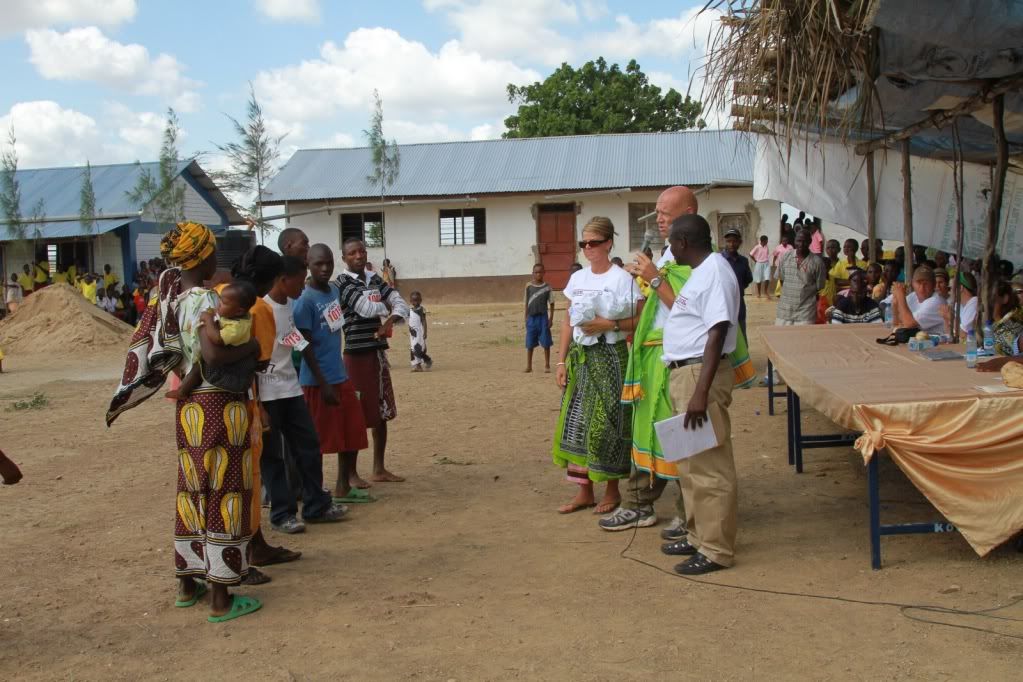 |
| Race winners honored at Gona celebration |
Later that day, at the celebration of the Tingey School of Gona, all of the marathon winners were introduced and the men were given their prize money in front of a duly impressed crowd. There was just a brief mention that the women had already received a prize earlier in the day. I think there were more than a few Americans who were disappointed that they hadn’t let the people know that the women had also received their prize money. However, this is not our culture and change is a slow, tedious process. It was a frank reminder that we cannot just go over there and change their world in a day – nor should we. They are a beautiful people with a long history and while we ache for them to have the comforts and advantages we do, there are many obstacles to overcome and change will take time. The fact that Koins now has the first female university student from the village studying in Nairobi is huge. Hopefully more progress is on the way but to have used this marathon to take a hard stand about the need for Kenyan women to be treated like American women would have proved disastrous. Thank you Baba Bret.
The whole thing was quite a learning experience for us all. The fact that this Kenyan mother, Kwe Kwe, could earn money by simply running 13 miles proves that sometimes you really can “run for your life.” She will likely buy food, maybe clothing for her children but whatever she does, she now has an American sister she will never forget. Monica, who always looks like she just stepped out of a fashion magazine, chose to spend the following night with Kwe Kwe at her home, learning what it feels like to sleep in a mud hut with no water to drink and no hand blowers in the restrooms. She came home humbled and teary-eyed and it was clear to us that Monica will never be the same. The second-place winner, also named Kwe Kwe, undoubtedly marveled at her good fortune at the hands of an unknown American woman who wanted to make a difference. It was an honor to witness this bit of compassion and sisterly love. Well done, Monica.
Karen Timothy
_____________________________
I had the opportunity to ride backwards on a motorbike driven by Bret, to film and photograph the race from that perspective. It was a bit of a challenge, but a fun way to see the faces and effort being put forth by the runners. It was also a kick to see the faces of the villagers as they watched me from my awkward vantage point, wondering what the crazy white woman was doing.
I saw the women at the beginning of the race, the Kenyan women with their shy, quiet approach to the starting point (running is simply not something that Kenyan women do publicly). I saw the determination in KweKwe's pace, she wanted to be the first over the finish line. She kept looking over her shoulder to ensure she was in first place.
I saw the dusty and bleeding feet of the two KweKwe's as they finished the race, having run barefoot the entire way.
I saw the faces of the KweKwe's as they were given their prize money in a quiet, post race gathering. The incredulity of the prize they were receiving was obvious. It was almost as if they expected it to be taken back from them. They both quickly tucked the money into their clothing.
Karen Timothy
_____________________________
I had the opportunity to ride backwards on a motorbike driven by Bret, to film and photograph the race from that perspective. It was a bit of a challenge, but a fun way to see the faces and effort being put forth by the runners. It was also a kick to see the faces of the villagers as they watched me from my awkward vantage point, wondering what the crazy white woman was doing.
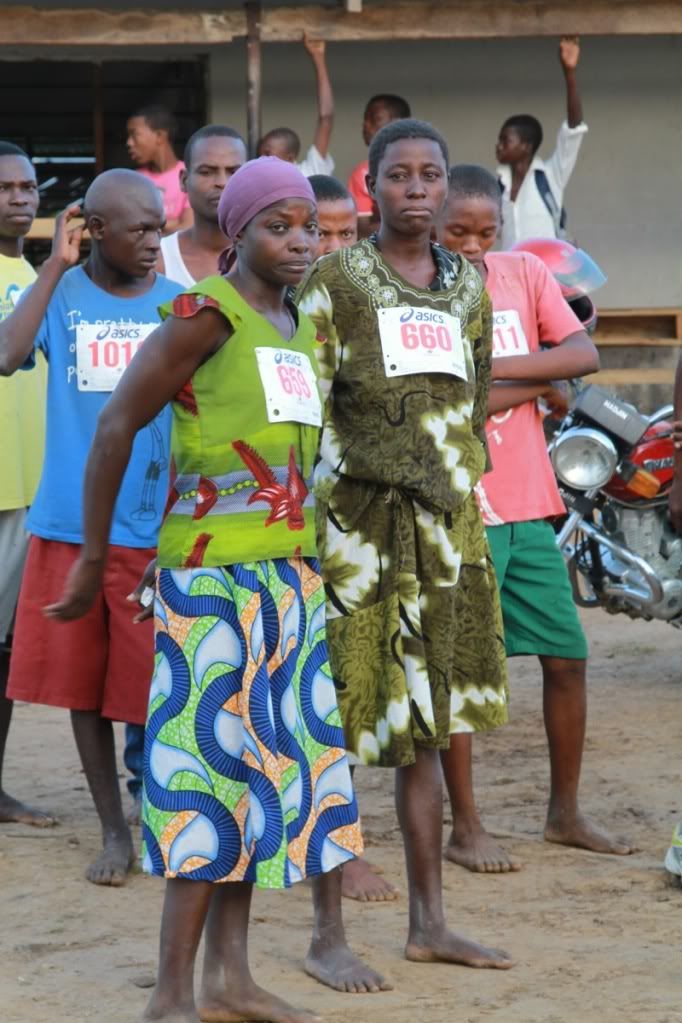 |
| The KweKwe's before the race started |
I saw the women at the beginning of the race, the Kenyan women with their shy, quiet approach to the starting point (running is simply not something that Kenyan women do publicly). I saw the determination in KweKwe's pace, she wanted to be the first over the finish line. She kept looking over her shoulder to ensure she was in first place.
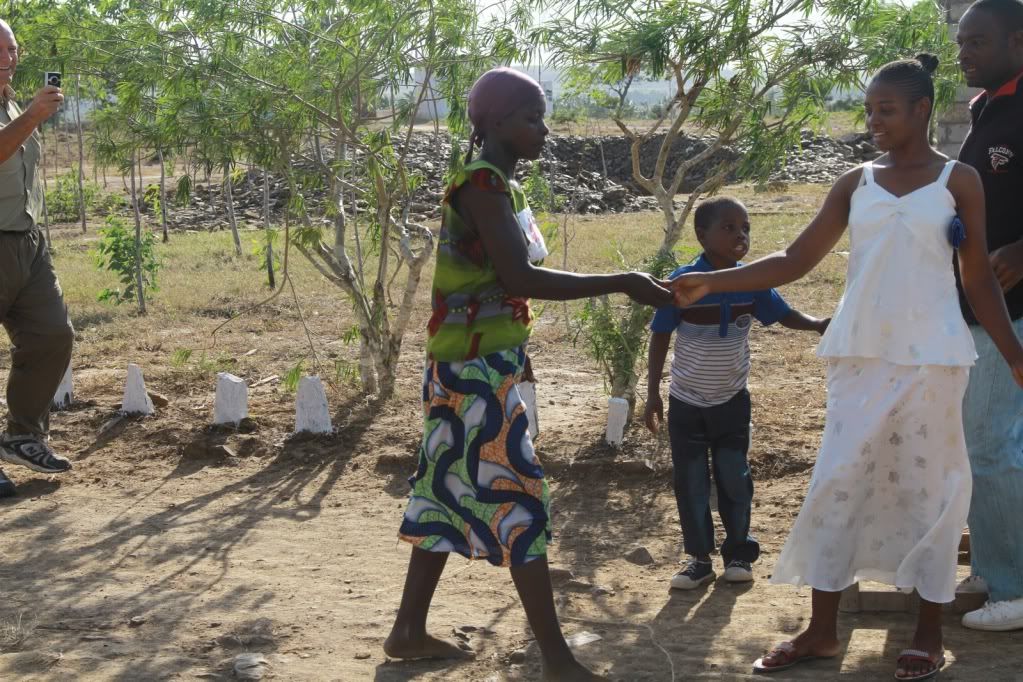 |
| KweKwe #1 crossing the finish line |
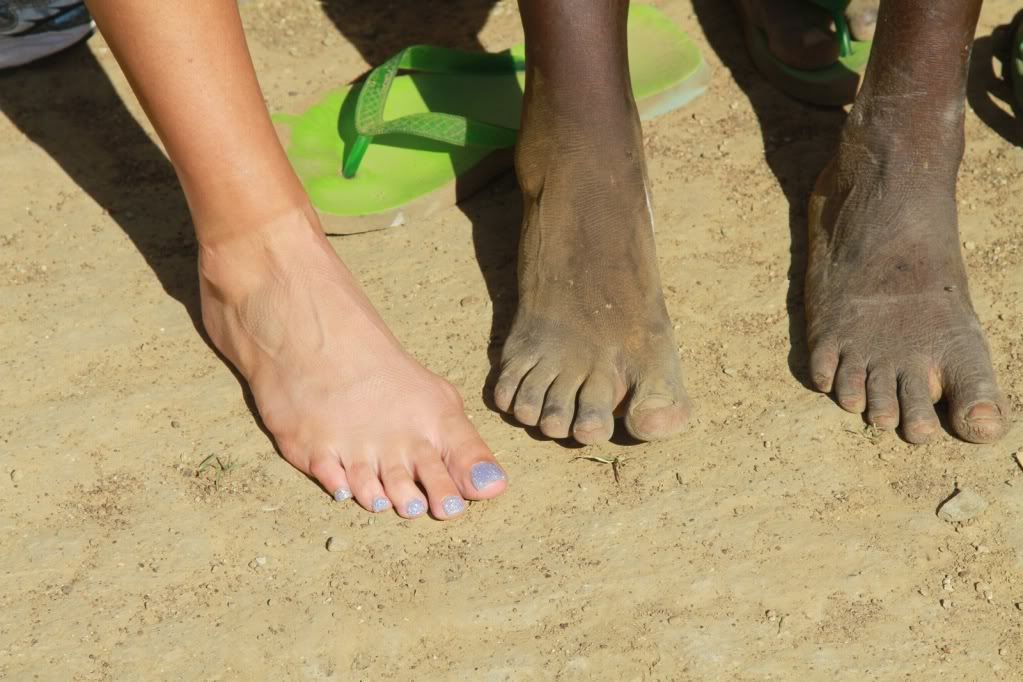 |
| Monica and the KweKwe's post race feet |
I saw the dusty and bleeding feet of the two KweKwe's as they finished the race, having run barefoot the entire way.
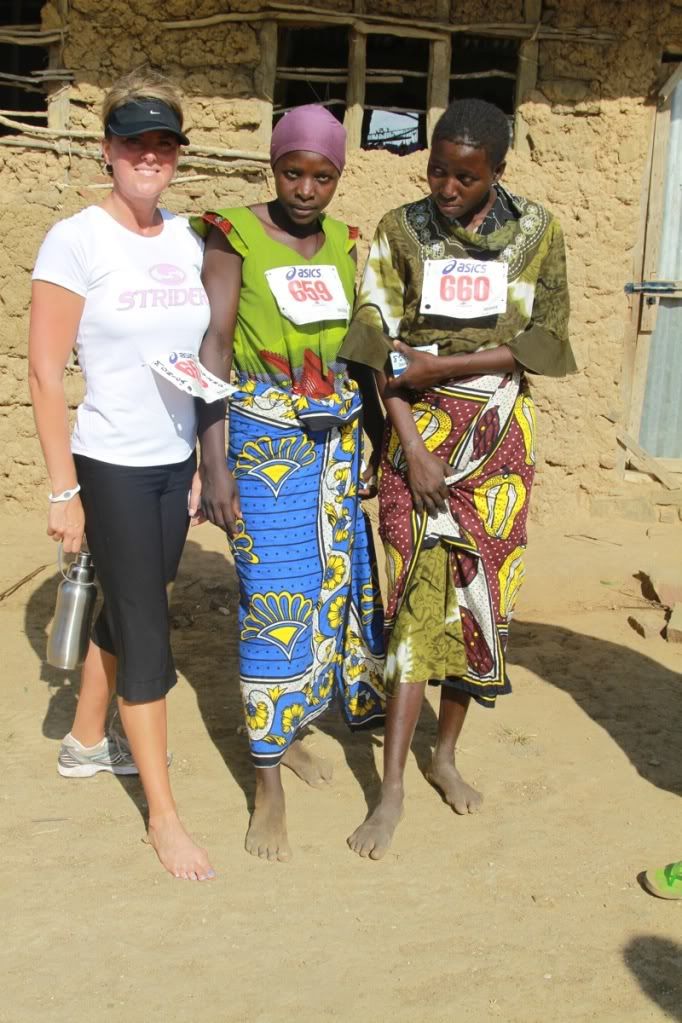 |
| Monica proudly poses with the two female race winners |
I saw the faces of the KweKwe's as they were given their prize money in a quiet, post race gathering. The incredulity of the prize they were receiving was obvious. It was almost as if they expected it to be taken back from them. They both quickly tucked the money into their clothing.
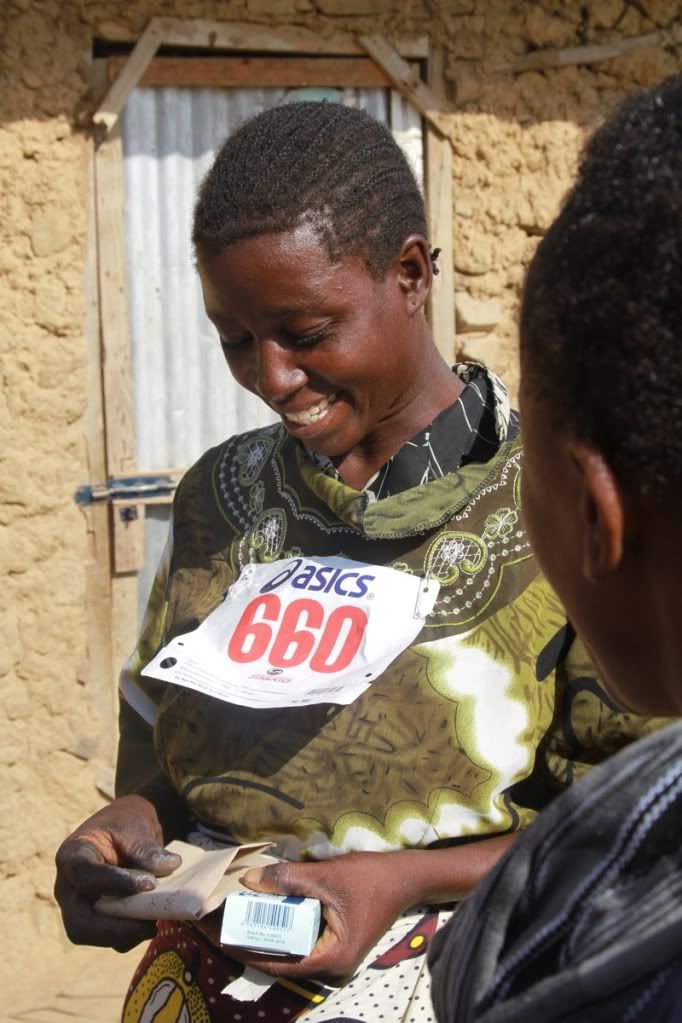 | |
| KweKwe #2 with her prize money |
Several of us gathered around the Kenyan women after the race, and asked them about their lives. KweKwe #1 was a 30 year old widow with 6 children. We all knew the impact the prize money would have on her family. KweKwe #2 had 4 children, and again, the impact of the prize money would be immense.
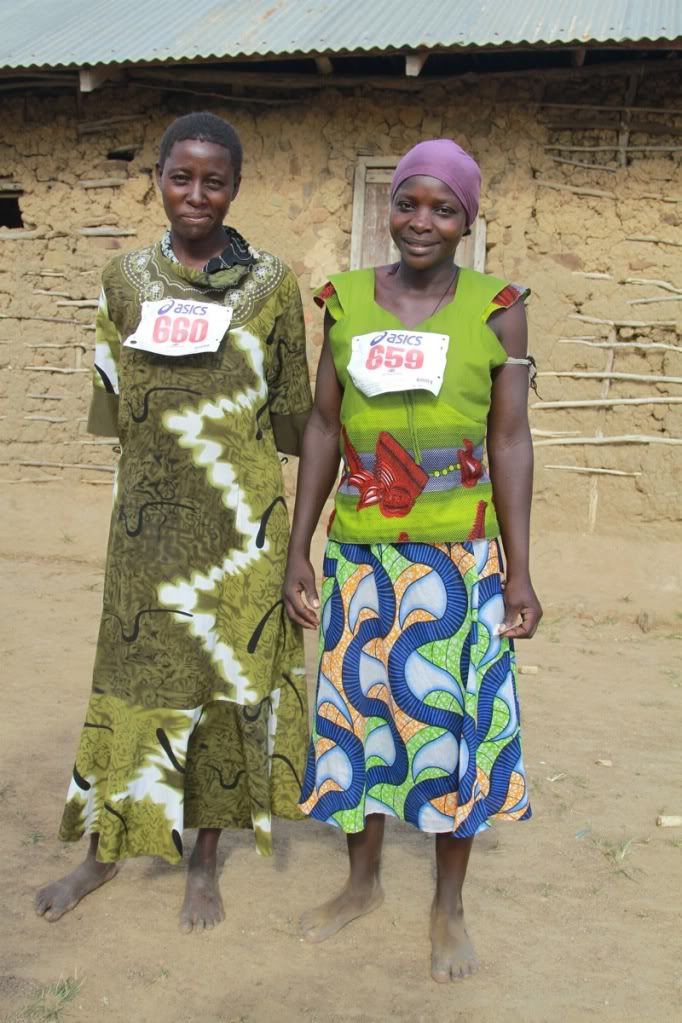 |
| Happy racers |
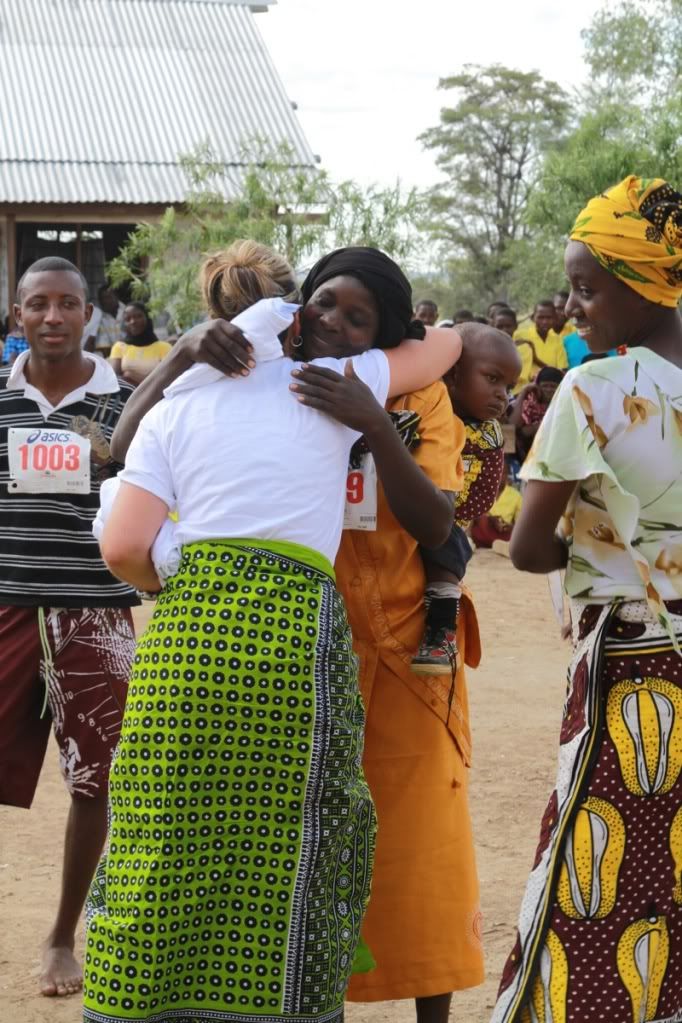 |
| Monica congratulating the women at the Gona celebration |
Sunday evening, KweKwe #1 walked to the KCC to visit with Monica. She brought a gift and wanted to personally thank Monica. Bret and Monica spent some time with her, and the end result was that Monica packed up a bag and headed off to KweKwe's home to spend the night with her family.
I was speechless. In all the years of Koins working in Kenya, I had never seen a woman spend the night in a villager's home. It is a common practice for the expeditioners to shadow a village woman during the day, and experience the day to day work of a Kenyan woman. However, spending the night in a mud hut is a totally different story.
We all worried about Monica and how her village experience was going. The next day we arrived at KweKwe's village area promptly at the designated time, expecting Monica to be there waiting for us. She arrived about 30 minutes later, regretful that she would not see KweKwe's children arrive home from school that afternoon. She had great stories to share of her experience, and fond memories that she will reflect on her entire life.
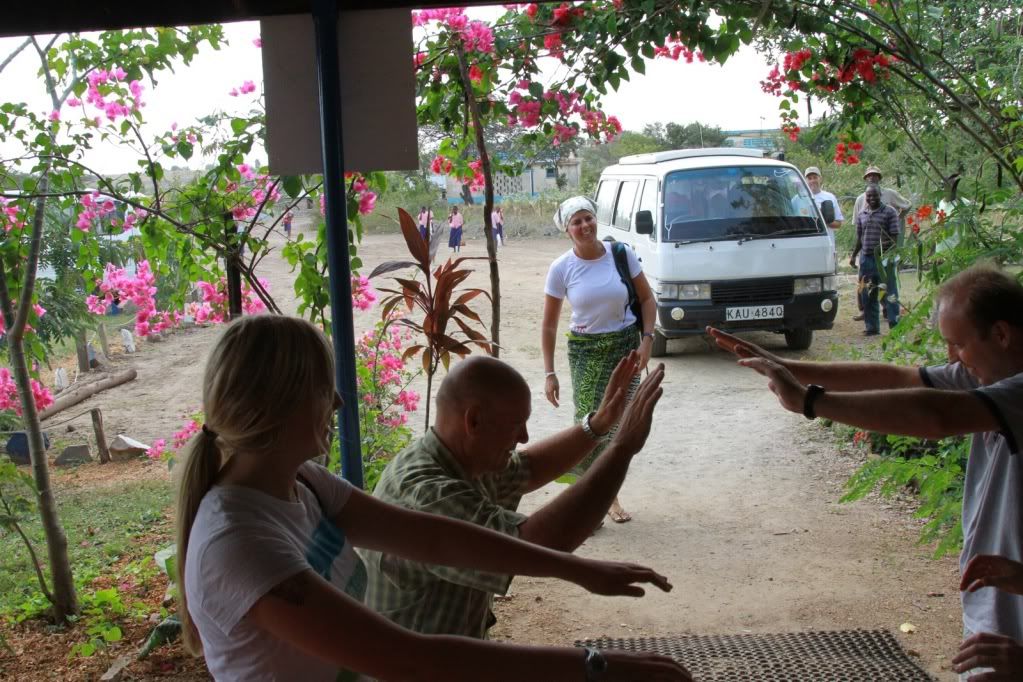 |
| Monica receiving adulation of fellow expeditioners upon her return to the KCC |
Monica left Kenya with a new sister of her heart. I left with a renewed desire to help the women of Kenya, who live such difficult, hardworking lives.
Asante, Monica, for your example.
IVL

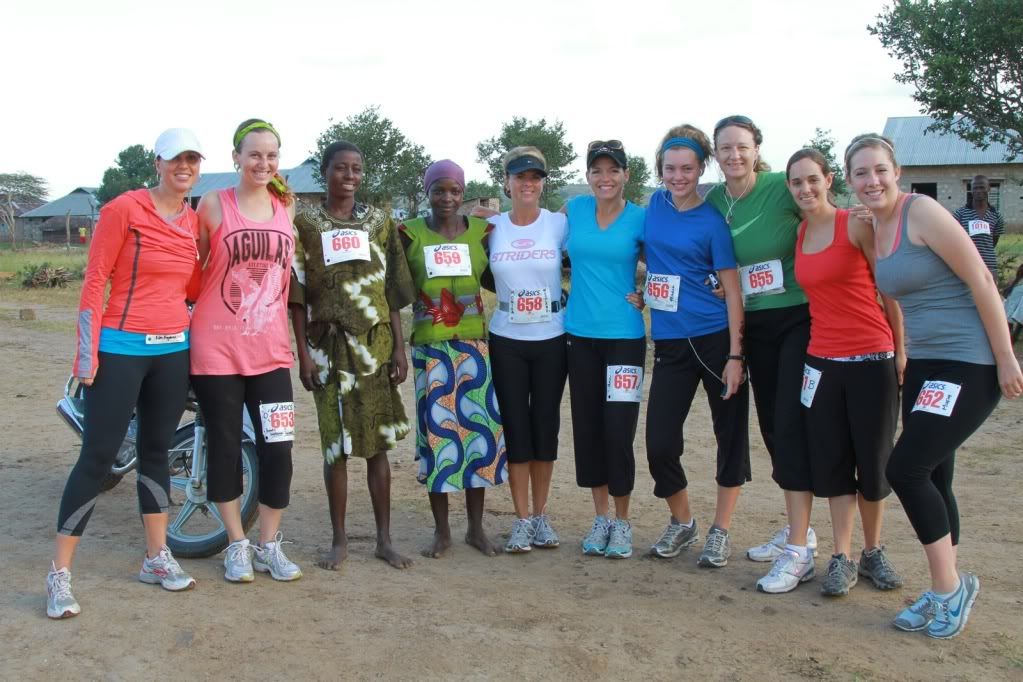
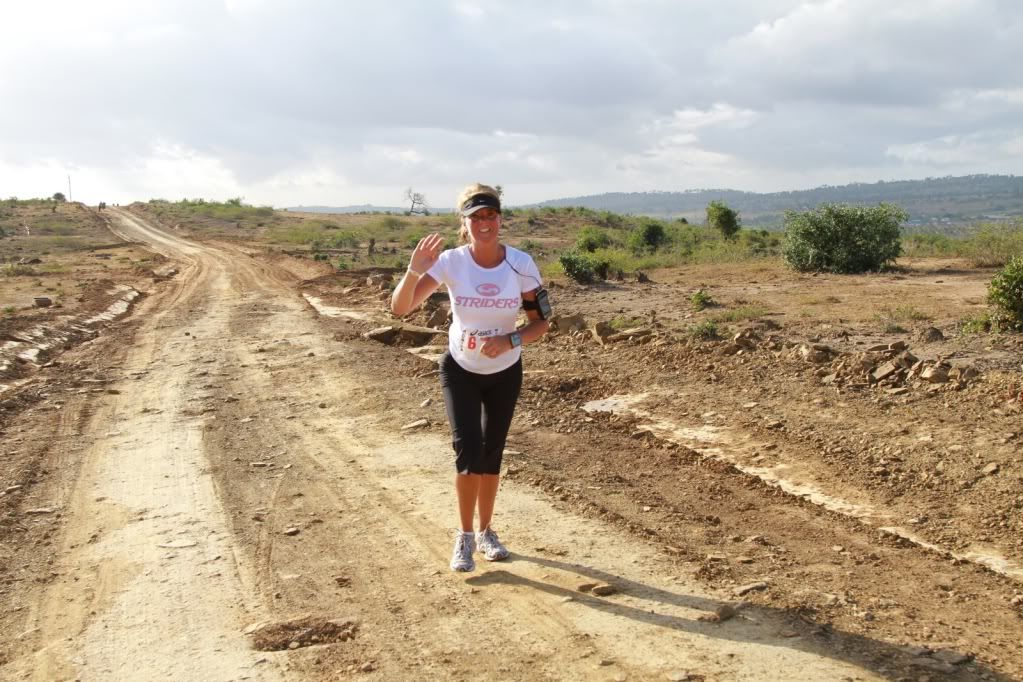
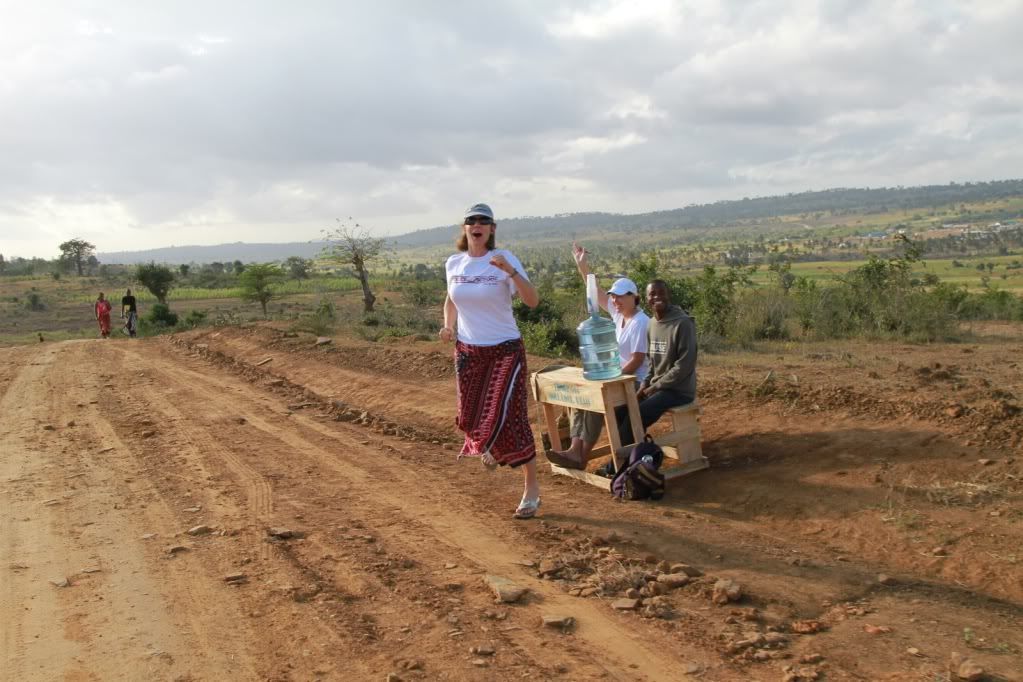
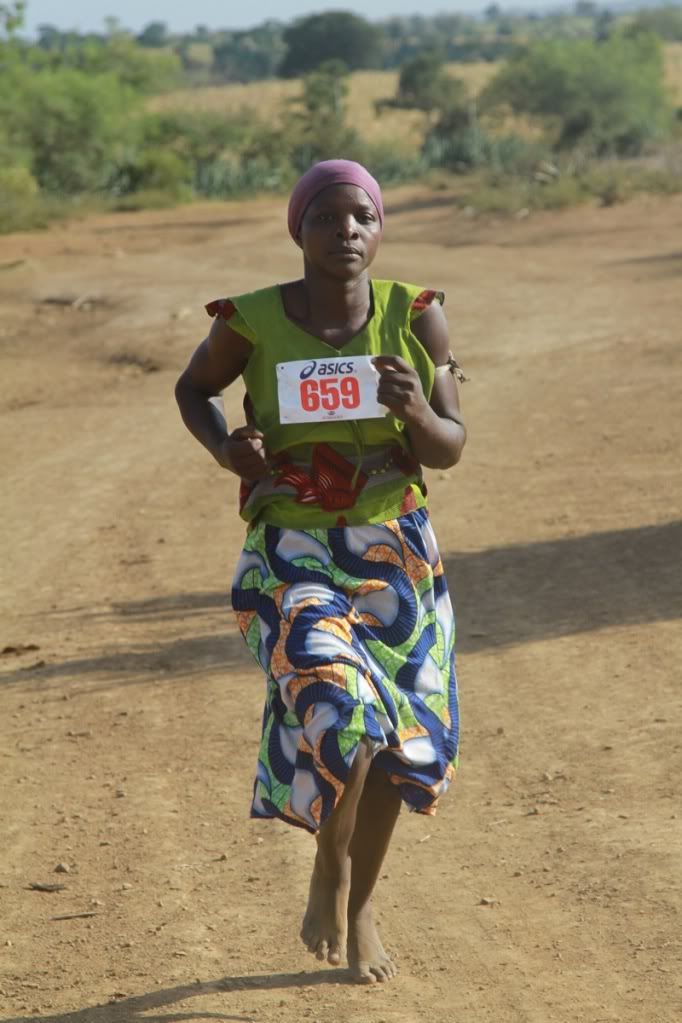
No comments:
Post a Comment